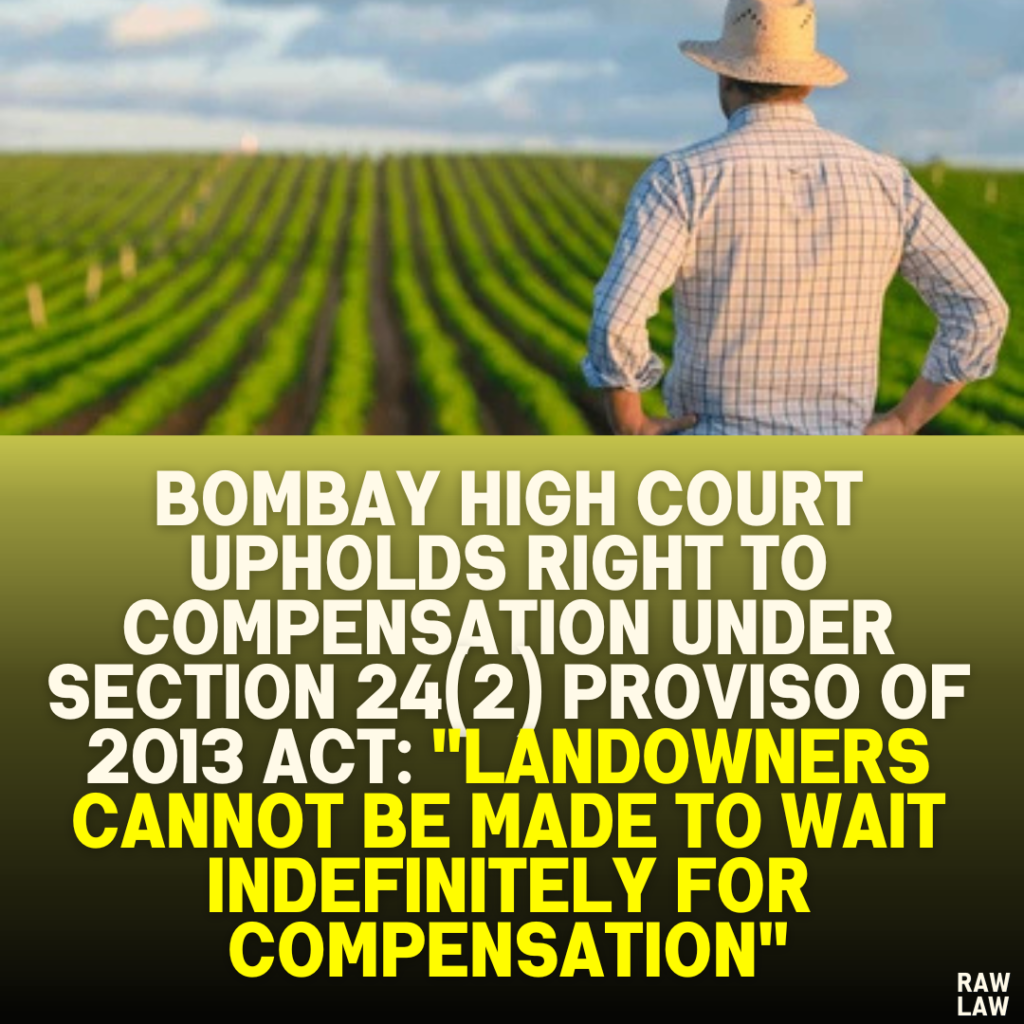Court’s Decision
The Bombay High Court ruled in favor of the petitioners, directing the respondents to compute and pay compensation under the provisions of the Right to Fair Compensation and Transparency in Land Acquisition, Rehabilitation, and Resettlement Act, 2013 (2013 Act). The court ordered:
- Compensation computation must be completed within three months.
- Payment of the compensation, along with consequential benefits, must be made within two months after the computation.
- A compliance report must be submitted by June 9, 2025, ensuring adherence to these directions.
The court emphasized that the petitioners had been waiting for compensation since the acquisition began in 1992 and that delays of such magnitude were unacceptable.
Facts
- Background of Land Acquisition:
- The petitioners’ lands were notified for acquisition in 1992 under the Maharashtra Project Affected Persons Rehabilitation Act, 1989, to rehabilitate persons affected by the Chitri Project.
- A land acquisition award was passed in 1999 under the Land Acquisition Act, 1894, but the petitioners claimed they neither received compensation nor had possession of their lands been taken.
- Initial Petition:
- The petitioners filed writ petitions seeking a declaration under Section 24(2) of the 2013 Act that the land acquisition proceedings had lapsed due to failure to pay compensation or take possession within five years of the commencement of the 2013 Act.
- Amended Petition:
- After the Supreme Court’s decision in Indore Development Authority v. Manoharlal clarified the interpretation of Section 24(2), the petitioners amended their prayers, seeking compensation under the 2013 Act, relying on its proviso.
- Respondents’ Stand:
- The respondents admitted that compensation had not been paid because the acquiring body failed to deposit funds with the State Government. They argued, however, that possession of the lands had been taken in 2018, making the lapsing of acquisition inapplicable.
Issues
- Whether the acquisition proceedings had lapsed under Section 24(2) of the 2013 Act.
- Whether the petitioners were entitled to compensation under the proviso to Section 24(2) of the 2013 Act.
Petitioners’ Arguments
- The petitioners argued that no compensation was paid despite the award being passed in 1999.
- They contended that under the proviso to Section 24(2) of the 2013 Act, they were entitled to compensation since the majority of the landholdings’ compensation had not been deposited or paid to beneficiaries.
- They relied on Indore Development Authority to support their claim that the proviso was applicable to their case.
Respondents’ Arguments
- The respondents submitted that possession of the lands had been taken in 2018, and therefore, acquisition proceedings had not lapsed.
- They admitted that compensation had not been paid due to the acquiring body’s failure to deposit funds.
- They conceded that the petitioners were entitled to compensation under the 2013 Act’s provisions.
Analysis of the Law
- Section 24 of the 2013 Act:
- Section 24(2) states that acquisition lapses if:
- Physical possession of the land is not taken, and
- Compensation is not paid within five years of the Act’s commencement.
- The proviso ensures that compensation must be paid under the 2013 Act if it has not been deposited or paid for the majority of the landholdings.
- Section 24(2) states that acquisition lapses if:
- Supreme Court Decision in Indore Development Authority:
- The five-judge bench ruled that the word “or” in Section 24(2) must be read conjunctively as “and.” This means acquisition does not lapse if either possession has been taken or compensation has been paid.
- The proviso ensures landowners receive compensation under the 2013 Act when the majority of landholdings remain uncompensated.
- Coordinate Bench Ruling in Shital Walawade:
- The court ruled that landowners are entitled to compensation under the 2013 Act if compensation was not paid or deposited prior to April 1, 2014, even if possession was taken.
Precedent Analysis
- The court referred to Indore Development Authority for interpreting Section 24(2).
- The Coordinate Bench’s decision in Shital Walawade clarified that the lack of compensation payment entitled petitioners to remedies under the 2013 Act’s proviso.
Court’s Reasoning
- Interpretation of Law:
- The court noted that the petitioners’ lands constituted a majority of the landholdings in question.
- No compensation had been paid despite the award being passed in 1999.
- Delay and Accountability:
- The court highlighted the respondents’ failure to pay compensation for over two decades, stating:“The petitioners cannot be made to wait indefinitely for compensation for their acquired lands.”
- Compliance with Precedents:
- The court applied the principles from Indore Development Authority and Shital Walawade, holding that the petitioners were entitled to compensation under the 2013 Act’s provisions.
Conclusion
- The petitions were allowed.
- The court directed the respondents to:
- Compute compensation within three months.
- Pay compensation along with consequential benefits within two months of the award.
- Submit a compliance report by June 9, 2025.
Implications
- Reinforcement of Landowners’ Rights:
- The decision underscores the importance of ensuring timely compensation to landowners under the 2013 Act.
- Accountability for Government Authorities:
- The ruling establishes a clear timeline for compensation to prevent indefinite delays.
- Significance of Precedents:
- The judgment reaffirms the binding nature of Indore Development Authority and similar precedents, ensuring consistency in land acquisition cases.



